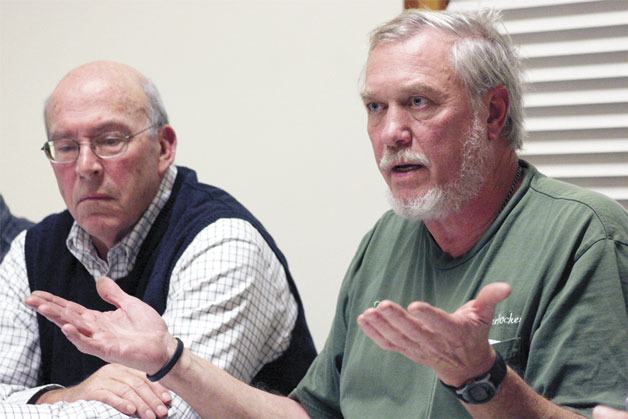FREELAND — Stop throwing money down the “rat hole” of a $40 million sewer project that’s opposed by most people who live in the Freeland area, residents told the board of the Freeland Water and Sewer District Monday.
Residents also asked sewer district commissioners to rescind the resolution that called for a local improvement district, or LID, which would give the sewer district the authority to make property owners pay for the new sewer system.
Opponents of the controversial $40 million plan said the project is overpriced and would hit property owners with assessments that could total tens of thousands of dollars.
Critics also charge that the original plan was for sewers in the downtown commercial core of Freeland, but the proposal was expanded in a way that makes residential properties shoulder most of the costs for the unwanted sewer system.
“This train is going down the track and it needs to stop,” Mike Gregory told sewer commissioners.
“You guys need to give your heads a shake, I’m sorry. A lot of money has been spent here, and it’s going down a rat hole,” Gregory added.
“It’s a waste of taxpayer dollars for you to pursue this,” added Pam Neschke, another resident in the sewer district. “I think it ought to be stopped.”
District officials estimate $2.5 million has been spent on a new sewer system for Freeland so far, mostly on consultants.
Neschke said the board should wait until the citizens advisory committee on a new sewer system had completed its work.
The district should also seek money from the group that originally wanted a sewage treatment system: the downtown business community, residents said.
“I think this LID and this $40 million sewer project should be stopped, and not a penny spent more on it. Allow the [citizens advisory committee] to pursue the other options,” Neschke said.
“Allow the commercial core to participate if they choose to, and leave the residents out of it until the residents choose,” she told commissioners.
Neschke also pointed out that LIDs are usually created by property owners with 60 percent or more of the affected land area.
But in Freeland, sewers — and the costly assessments — were being forced on unwilling residents.
“I’m not against sewers, I just don’t need it right now. And neither do a majority of the first-phase people,” she said.
That said, Neschke added that support seemed to be lacking for sewers in the downtown area as well.
“I have talked to a number of business people. They’re not for it either. I don’t see where your backing is,” she told district officials.
“I think it’s a waste of your money. Our money.”
District commissioners said they never wanted to force the infrastructure improvements on an unwilling public.
Officials tried to defuse the growing chorus at Monday’s meeting, and admitted that opinions had changed when the district realized the current $40 million plan wouldn’t pencil out.
“There was never any intent to impose that kind of a burden on Freeland property owners,” said District Commissioner Eric Hansen. “We really have scaled way back on our efforts, except for the hydrology study.”
“I understand the concern … this cloud that’s hanging over everybody,” Hansen added. “We’d like to close that wound, too, and let people move on.”
“Believe me, we never had any intention of imposing that $40 million burden on the citizens of Freeland,” he said.
Sewer officials repeatedly stressed the LID had been “postponed indefinitely,” and Hansen said there were “no plans” for an LID.
Though district commissioners repeatedly said the LID was on hold, they refused to rescind the resolution that called for the improvement district at this week’s meeting. Some in the audience complained that the district was reneging on a promise made earlier to have the repeal on the agenda.
Sewer Commissioner Rocky Knickerbocker opposed any talk of pulling the plug on the LID.
He said the district had paid its attorney to make the LID flexible, and that the setup already approved by the district was crafted to be flexible so it would still be relevant if the area covered by the improvement district was changed.
“The LID is in limbo,” Knickerbocker said.
“It is changeable,” he added.
“Size, shape, all of that is still changeable. It’s not locked in to the present phase one. If it’s decided by the [citizens advisory committee] and this board, to change the phasing back to the five [phases], that LID could still be a tool that we could utilize for the project that you guys are working on,” he said.
“It’s totally adjustable,” Knickerbocker said.
Emily Malzone, however, noted that the LID resolution was too detailed to be as flexible as Knickerbocker claimed.
“To me it seems like the LID is very specific to a phase. And right now we have one enormous phase that the five phases were compressed into,” Malzone said.
When pressed to say why the board would not dissolve the LID, Knickerbocker said the district wanted to avoid the legal cost of the work. They were also worried it might affect the district’s ability to get grant money and other funding for the project.
Gregory, a Freeland resident, said the outlook on getting outside money wasn’t pretty, however. He prodded the commissioners to exert some leadership on the issue.
“It’s going to be the courage of three guys,” Gregory said. “You’re the three guys. You’re the ones who can make that decision. Nobody else can make it for you.”



